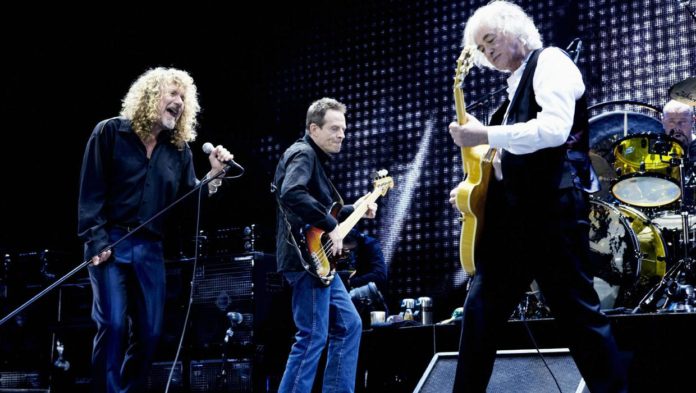12 Take That There were tears and tantrums among their legion of teenage fans when the best manufactured pop band of the era called it a day in 1996. Few of those devotees could have imagined that 11 years later the group — sans Robbie Williams (who’d left in 1995) — would make a remarkable return. Beautiful World was Take That rebooted spectacularly. It spawned several hits, a hugely popular tour and became the second best-selling album of 2006.
11 Cher
An uncharitable critic once suggested that only two creatures would survive a nuclear apocalypse: cockroaches and Cher. And yet, for a singer who had a great 1970s, Cherilyn Sarkisian’s music career took a nosedive for most of the next 20 years as she focused instead on acting. Although she enjoyed a hit with 1989’s If I Could Turn Back Time, it wasn’t until 1998 that Cher truly reclaimed former glories. The auto-tuned Believe — now a gay anthem, par excellence — became a global smash and her first US number one since 1974’s studio album, Dark Lady.
10 Kate Bush
Kate Bush was just 19 when she scored a UK number one with Wuthering Heights — a stunningly original song inspired by the Brontë novel and one of the strangest to ever top the charts. She barely put a foot wrong, creatively, in the 1980s and early 1990s — but then she disappeared for a dozen years, opting to devote all her energies to motherhood. The time away only burnished an already lofty reputation; 2005’s comeback album, Aerial, demonstrated that she had lost none of her bewitching gifts.
9 Meat Loaf
The big man never went away — there were four albums in the 1980s — but everyone wanted another Bat Out of Hell, his 1977 debut, and a veritable rock-opera opus. He finally delivered what the fans wanted in 1993 — with considerable help from Jim Steinman, the songwriter who is fundamental to the Meat Loaf story. Bat Out of Hell II: Back to Hell had its origins in the late ’70s but suffered several problems along the way — not least when a lyrics book was stolen. It sold 14 million copies. A third Bat Out of Hell album appeared in 2006.
8 David Bowie
In 1980, David Bowie released an album, Scary Monsters (and Super Creeps) that completed 10 years of breathtaking, envelope-pushing creativity. For decades, he would not come close to matching that album’s brilliance. While there were some very bad albums, like 1987’s Never Let Me Down, much of the lampooned music from the time later enjoyed a critical reappraisal. But his final pair of albums, The Next Day, from 2013, and Blackstar, which was released days before his death in 2016, are quite exceptional.
7 The Eagles
When the massively popular Californian band called it quits in 1980, Don Henley was unequivocal about a future reunion: hell would freeze over, he said, before they’d get back together again. He went on to enjoy a significant solo career in the 1980s, with massive hits like The Boys of Summer. But with concert promoters dangling huge incentives in front of them, Henley, Glenn Frey and the rest decided to patch up their differences and embark on a lucrative world tour and subsequent live album. Its title? Hell Freezes Over.
6 Leonard Cohen
Two years after the release of his 1992 album, The Future, Cohen seemingly abandoned his career and retired to a Buddhist retreat in Los Angeles. The great Canadian singer-songwriter had long been a follower of Buddhism and, in 1996, he was ordained a monk. But the lure of the recording studio was too strong and in 2001 he released a new album, co-written with Sharon Robinson. The highly regarded Ten New Songs kicked off a musical rebirth, with several more albums and — for Irish audiences — a bunch of magical shows.
5 Brian Wilson
The Beach Boys main man helped define the West Coast surf sound of the 1960s thanks to a glut of brilliant singles — and, in the extraordinary Pet Sounds, he delivered one of the best albums of all time. A sensitive soul in a brutally tough industry, Wilson lost his way for a long time. Drugs certainly didn’t help his cause. The Beach Boys kept touring without him, but it was always a poor facsimile. Then, in 2002, he returned with a reworked version of Smile — the great ‘lost’ Beach Boys album. It was a critical sensation and the subsequent tour, which called to Ireland, was glorious.
Video of the Day
4 Led Zeppelin
Comebacks may thrill the fans, but all too often the new material isn’t a patch on what’s gone before. Led Zeppelin’s comeback was a fleeting thing — but utterly remarkable too. In 2007, they played their first (and only) concert since the death of drummer John Bonham in 1980. The gig at London’s O2 Arena was in honour of the legendary music industry mogul Ahmet Ertegun. According to Guinness World Records, the show holds the world record for the ‘Highest Demand for Tickets for One Music Concert’, with 20 million requesting tickets.
3 Marianne Faithfull
The singer, actress and model was in a bad way for much of the 1970s. Drug dependency and homelessness had pushed her to the brink and it seemed as though a once-promising talent had been squandered. For some, if they remembered Faithfull at all, it was merely as Mick Jagger’s former girlfriend. Then, in 1979, she returned with a stunning new release, Broken English — her first significant album in 12 years. It’s still an extraordinary listen — the sound of a woman recapturing a sense of who she is and grasping hold of life.
2 Bob Dylan
The fabled Voice of a Generation has had several comebacks. You could argue that 1975’s Blood on the Tracks was his first consistently great album since Blonde on Blonde in ’66, or you could say that 1989’s Oh Mercy finally put Bob’s most wretched decade to bed. But the ultimate comeback, surely, arrived with 1997’s Time Out of Mind. It’s one of his very finest albums and he’s been in quite the form since — even winning a Nobel Prize in Literature in 2016.
1 Johnny Cash
The Man in Black’s late career rebirth was so successful that it’s sometimes easy to forget that for a few decades he was trading on former glories. Rick Rubin knows a thing or two about resuscitating old stars — look at the gold-dust he sprinkled on Neil Diamond late on in his career — and he worked the oracle on Cash in 1994 with the American Recordings album. It was the first of several great Cash albums that Rubin produced. And what an inspired idea it was to get the elderly icon to reinterpret Nine Inch Nails’ Hurt in 2002. It’s one of those covers that’s far better than the original. The video, directed by One Hour Photo’s Mark Romanek, is a stone-cold classic.








